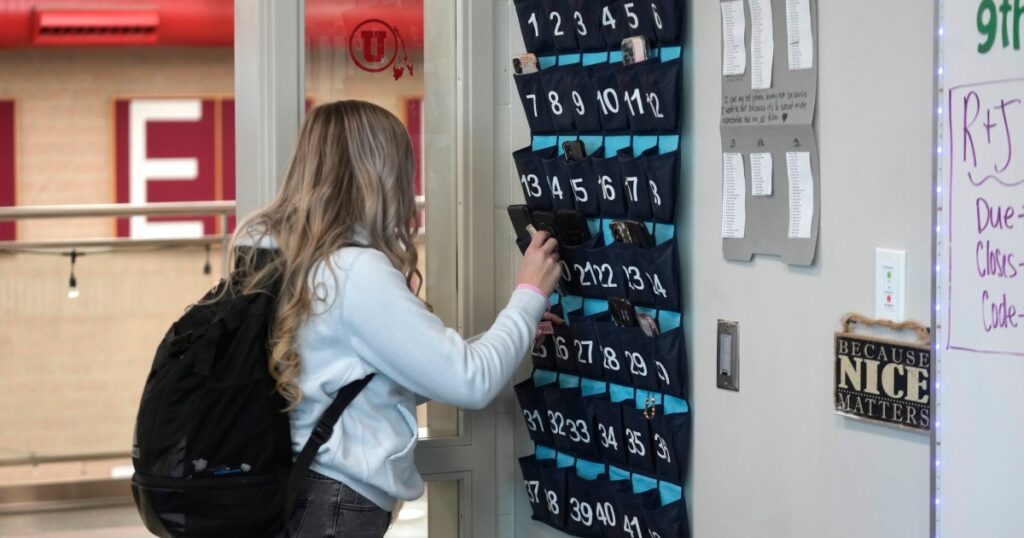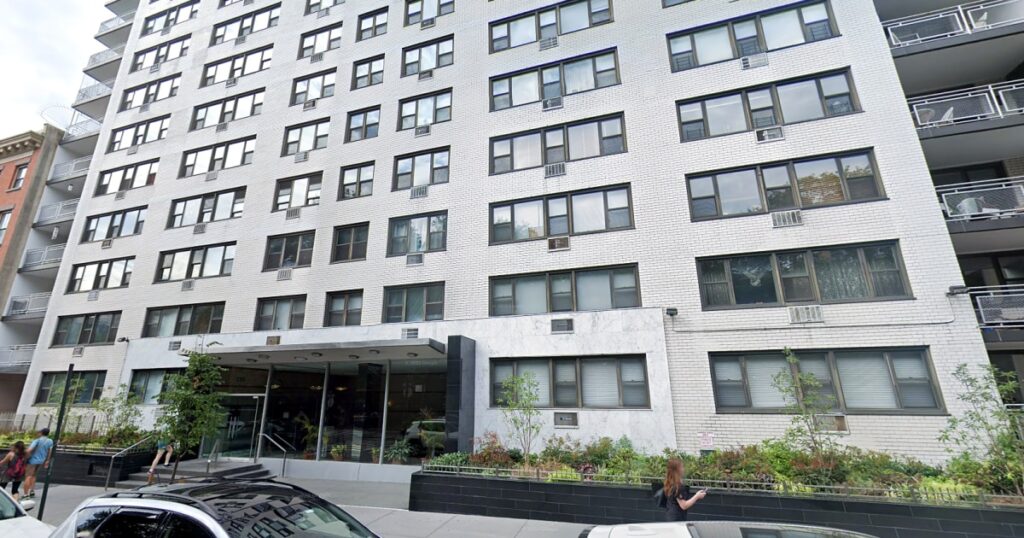More than 200,000 students at one of the largest school districts in the nation have started the school year with a major change: no cellphone use allowed.
“I’ve noticed such a big difference in the classroom. Students talk more. They actually do their work,” Dominique Mayorga, a teacher who installed a sleeve in her classroom that can hold around 30 phones, said.
Over the summer, Florida’s Broward County Public Schools made the decision to ban students from using cellphones and other communication devices for the entire school day. Students are to keep phones off or in airplane mode the entire day and relinquish them to designated areas, like Mayorga’s sleeve, during class, or face disciplinary action. The new policy, which went into effect in August, quickly sparked debate among parents, students, teachers and administrators.
Critics of the ban have raised safety concerns, arguing it could hamper communication during an emergency. It’s a particularly sensitive topic in Broward County after the 2018 Parkland shooting at Marjory Stoneman Douglas High School, which is in the district.
Response to the ban was quick. Parents flooded the comments of posts the district made on X and Instagram announcing the changes, circulating a change.org petition asking for the school to reverse the ban. It has garnered over 25,000 signatures.
Carline Dumoulin, a mother of two students at Broward’s Cypress Bay High School, is one of those signatories. Cellphones, she said, are “the way for us to communicate if there’s any type of problems going on at school, and I don’t need to go into the details — we know what’s happened before.”
Students “need to be able to communicate with the outside world, with their parents or their guardians, to let them know that there’s a problem,” Dumoulin added.
For many at Marjory Stoneman Douglas High, cellphones were an important resource during the shooting. Some students used their devices to text loved ones, post live updates or even take pictures and videos, some of which would later be shown at the gunman’s trial, where he was sentenced to life in prison for killing 17 students and faculty at the school.

Broward County school board member Lori Alhadeff said she understands parents’ safety concerns all too well: She lost her 14-year-old daughter Alyssa in the Parkland shooting.
But Alhadeff supports the ban, explaining that emergency protocols are in place to help alleviate those concerns. In schoolwide emergencies, for example, district policy says students will be able to access their devices from the place that their teacher has designated.
“On Feb. 14 [of 2018], all I wanted to do was hear from Alyssa. I texted Alyssa during that day, told Alyssa to run and hide, that help was on the way,” Alhadeff said. “I know it’s scary, but we have and will communicate with parents as soon as possible to let them know that their kids are safe.”
But Alhadeff said she’s open to adjusting the rules as time goes on. “I talked to students. I heard them loud and clear that they would like to use their phone during lunch and transition times and study halls,” she said. “And I’m absolutely open to the conversation.”
A full ban
The cellphone ban was put in place to adhere to a new law signed by Florida Gov. Ron DeSantis in May 2023. The law restricts the use of all wireless communication devices in public school classrooms, saying that they must be powered off during instructional time and placed in an area designated by the teacher.
Florida’s law is one of the first of its kind to go into effect in the U.S., but similar legislation has spread across the country, with at least 15 states including Indiana and Ohio adopting similar policies against cellphone use in public school classrooms. The most recent state to adopt restrictions was California, passing its Phone-Free Schools Act on Sept. 23.
Broward County took the Florida bill a step further and banned the use of devices for the entire school day.
Broward County school board member Debra Hixon was present at the meeting where the rule was approved, but had left before the vote. She said she would have voted against it because it should have allowed students to use their phones during lunch, as it is “their time.”
But during her time at the meeting, Hixon said, the board agreed to allow students to leave their phones on airplane mode so they could have quick access in case of emergency. Hixon, who lost her husband, Chris, in the Parkland shooting, said complaints and concerns have “really leveled off” and that parents understand cellphones will be easily accessible to students when needed.
On its website, Broward County nods to some concerns that inspired the legislation, including cyberbullying. Last year, a video of several students fighting at West Broward High School circulated online, gaining thousands of views on X. Following the fight, the school’s principal sent a message to parents warning that “students who videotape” fights were also at risk of disciplinary action.
Board member Allen Zeman is a strong proponent of maintaining the cellphone ban for the entire day. He emphasized the negative impact cellphones can have on students, including how they’ve worsened mental health and caused distractions.
“If nobody has social media, if nobody has an ability to ‘like you’ or to do any kind of action, or to share something with you that everyone else has seen, so you have to see it too, your day is better,” Zeman said. “You can breathe. You can take a little longer to enjoy a lecture or to sit on the grass and enjoy your lunch, rather than be buried in your cellphone. That’s why Broward County did it from bell to bell, and it’s why it’s important that it’s enforced for everybody.”
Zeman also emphasized the alarming decrease in literacy rates in public schools. A report by the National Assessment of Educational Progress found that reading test scores have been declining since 1992.
Max Schachter, who lost his son Alex in the Parkland shooting and has since become an advocate for safe schools, also said he is in full support of the cellphone restrictions and believes that the safety protocols will protect students even when they are without their devices. He added that in emergency situations, students should focus on following safety procedures, not be on their phones.
“During an emergency, kids should not be contacting their parents. Parents are not going to be able to do anything to help their children anyway,” Schachter said.
The state has also taken steps to address school safety. Following the 2018 shooting, Florida passed school safety legislation creating Alyssa’s Alert, which requires schools to install a mobile alert system that will call the authorities in an emergency, as well as the Marjory Stone Douglas High School Public Safety Act, which increased school security personnel and surveillance in public schools. The district has also invested over $2 million in installing metal detectors in its schools.
Classrooms and hallways
Keeping students off their phones when outside of classrooms has proven hard to enforce.
Two teachers and a student who spoke to NBC News said that inside the classroom, the rules have been in full force, but passing periods and lunch are where things get murky. A spokesperson said the district has been collecting survey data that will be reviewed in November to assess how the ban has been going.
Leo Jimenez, a science teacher at Cooper City High School, said enforcement during class has been going well and that he has seen improvement in his students’ focus during class time. He already had rules regarding cellphone use in his classroom before the ban, he added, and the district rule has helped back him up.
However, during lunch and passing periods, Jimenez said, it’s been rare to see enforcement, and he doesn’t believe many other schools have been enforcing it during those times either.
“It’s a battle that I don’t think anybody wants to fight.” Jimenez said.
Board member Hixon said that she has been hearing similar things about enforcement of the rules.
“In the hallways, they’re using it, and they’re just not really doing it to the fidelity of the law,” Hixon said. “Again, my concern [is] with the lunchtime restriction, because who’s supposed to be monitoring and enforcing that?”
However, board member Zeman has been hearing different feedback.
“The enforcement has been no issue in Broward County Schools,” Zeman said. “Where we want to enforce the rules, we do a very good job of it, as do most school districts across the country.”
The solution that many teachers have found to get students off their phones during class are cellphone pocket sleeves. Jimenez said he has installed a sleeve in his classroom, like Mayorga.
Marlena, a sophomore at South Broward High School, said she’s seen virtually no enforcement of the rules during lunch and passing periods.
“If they did enforce it during their lunch and passing period, I wouldn’t want that,” Marlena said.
Room for improvement
Mayorga, the art teacher, said she believes there’s still room for improvement in enforcing the new rules, pointing to Orange County Public Schools, another school district in Florida that has implemented a similar policy to Broward’s. Mayorga said having resources such as additional school personnel to enforce the ban during lunch and passing periods, as she said Orange County has done, could help its efficacy. A Broward County Public Schools spokesperson said a variety of staff members — including administrators, security personnel and teachers — are tasked with supervising the use of cellphones in the hallways and in lunchrooms, but the number of staff assigned to the role is determined by each school.
In Broward County, the conversation around the ban is set to continue. A district spokesperson said the board would be discussing the survey results and feedback on the ban.
“At the end of the day, we need to make sure that the end user, which is our students, that they’re happy and that the policy is being followed with fidelity,” Alhadeff said. “I think it is a very difficult thing to have teachers constantly be phone watchdogs, and so I do believe that the board is open to some solutions that might make everybody happy.”



